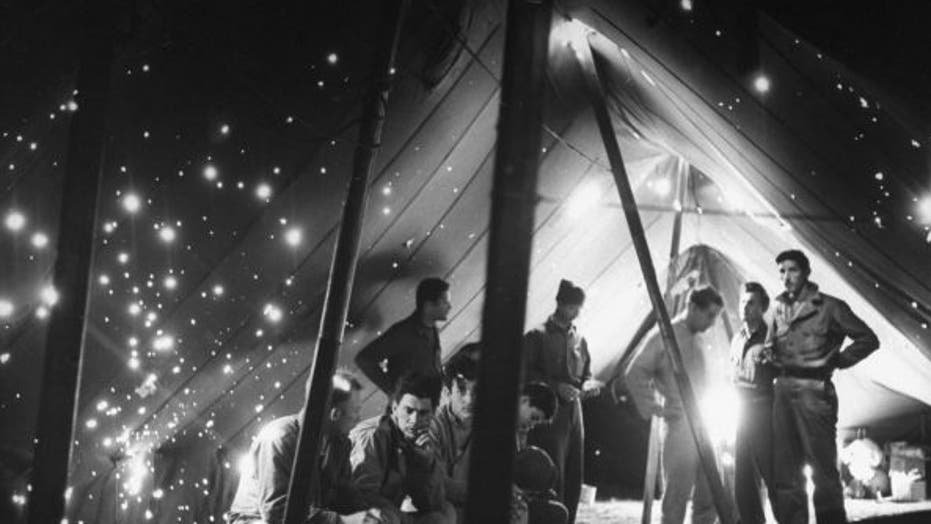To my generation, the word “Anzio” has a connotation like Antietam and Okinawa.
Bob Lynch, a Florida neighbor and a vigorous 92-year-old Irishman from Rye, N.Y., served at Anzio in the Second World War with the fabled 3rd Infantry Division. He managed to survive some 330-plus days in front-line combat across France and Germany in 1944 and 1945.After years of silence and bitterness, Lynch now talks of all he saw.
We who were too young to fight cannot spend enough time listening to this dwindling group of heroes.We should stand up and salute them when they enter the room. They will soon be gone.
[pullquote]
Lynch enlisted in the Army in April 1943 through the ROTC program at New York University.At 19, he was all of 130 pounds as a soldier. He had his conflicts with military discipline, but he never surrendered his buoyant optimism.
His letters home were carefully saved and form the main part of his book, “A Letter Marked ‘Free’: A Powerful and Gripping Account of Combat Soldier in World War II.” His theme is his faith in the salutary power of his “Guardian Angel.”
After reading his memoirs and listening to him over lunch describe the fog of war and the looming presence of death at any moment, I began to get a sense of what he had endured. When I asked him how long it took him after the war to get over hatred and to begin to tolerate the memories of what he had experienced, his answer was chilling – “about 30 years.”
The Army officially estimated “the average soldier can stand no more than 240 days in combat before going mad.” Wryly, Lynch asks, “Where does that leave me?”
His 330 days on the front lines are witness to his remarkable good fortune. He kept low to the ground with his head down and eyes alert. He prayed a lot.
Lynch captures the tragedies of Anzio in his memoir. The landing of the two Allied divisions went well at first, but, once ashore, the Allied commander, General John P. Lucas, grew timid and foolishly halted expansion of the beachhead. That allowed the Germans precious time to move into place some three divisions that commanded the hills north of Anzio and were able to use their artillery to blast Allied positions.
The invasion stalled in a bloody stalemate. Both sides took enormous casualties. Lynch witnessed the decimation of his division.
He wrote: “Everyplace you looked you saw dead or wounded G.I.s. It seemed impossible to escape death. We were slowly being annihilated. You could see terror in your buddies’ eyes.”
During the battle, several Ranger battalions moved past Lynch to attack Cisterna and were ambushed. The official report was that of 767 soldiers in the two units, only six returned to Allied lines.
For months Lynch and his unit battled to hold their ground.
One night, 28 new recruits joined Lynch’s position, but by dawn all but one had been killed. Top leadership wavered. At one point the overall Allied commander, General Mark Clark, began to plan for another Dunkirk. But eventually, Lynch and his colleagues broke out and moved toward Rome.
Here is Lynch on the day of the long-awaited breakout toward Rome.
“The day we began our path northward toward Rome, we suffered the highest number of casualties in a single day yet known in this war. The machine gun, mortar, automatic rifle fire and mine fields were wicked! And we had to walk straight through them. The German 88 millimeter shells kept screaming at us. Death was all around. I saw a body blown at least 50 feet into the air. He looked like an old sack of clothes coming down. You heard soldiers screaming for medic or holding their torn mangled leg with blood streaming. One buddy showed me what was left of his leg and he thought he was lucky to get away so easy…” (May 23, 1944)
Their war was not over. From Rome, Lynch and the 3rd Division were assigned to invade France at St. Tropez.
There, Lynch made his second amphibious assault. This time the Germans were reeling, and the Allied forces sliced north through retreating German defenses and up the Rhone Valley. As they crossed the Rhine, however, the Germans fought bitterly and the winter battle at the Colmar Pocket was the worst time of the war for Lynch.
The freezing weather and the fierce opposition of fanatic SS troops cost the Americans heavily. On one occasion, Lynch and his men surrounded some 30 SS men in a small building and set the structure on fire. He tells of listening to the screams of the dying Germans as the building burned through the night. The Germans knew the Americans had long since given up letting any SS surrender.
War is indeed Hell.
Lynch survived to become a successful New York bank executive. He seems as amazed at his good fortune as are we who listen to his stories.
There can be no explanation for survival except the Guardian Angel whom Lynch credits. This little hero with the ready smile and the wry sense of humor is humble but proud. He did his job and willingly suffered doing it.
He received a few medals and honors, but nothing too special.
His duty, his country and his honor were his motivation. Our thanks and respect are his reward.
One has to hope and trust we will find his kind to serve in the future.

